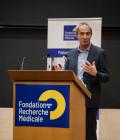Editorial
About the laboratory
The research field of the Brain Plasticity laboratory is the study of the molecular, cellular, anatomical and behavioral mechanisms of neuroplasticity. This theme is addressed by an integrated multidisciplinary approach, combining genetics, molecular and cellular biology, neural network studies, brain imaging, physiology and behavior.
Our laboratory brings together researchers interested in understanding the functioning of the brain at different scales, in order to develop collaborations and synergies. Complementary biological models are studied, the brain of the Drosophila (Thomas Preat & Pierre-Yves Plaçais’s team and Raouf Issa’s team), the brain of mammals (Karim Benchenane’s team, Philippe Faure & Alexandre Mourot’s team and Gisella Vetere’s team), and the human brain.
The unique situation of the Brain Plasticity laboratory, within ESPCI Paris, allows us to develop unusual and fruitful bridges between neurobiology and physics.
In the light and continuity of the study of basic mechanisms of neuroplasticity, our projects include, concretely or potentially, applications to human cerebral pathology. We are interested in psychiatric illnesses (depression, addiction, stress) (Karim Benchenane’s team and Philippe Faure & Alexandre Mourot’s team), understanding neuronal mechanisms involved in sleep physiology (Karim Benchenane’s team), understanding neural codes and brain plasticity underlying memory processes (Gisella Vetere’s team) and reinforcement learning (Philippe Faure & Alexandre Mourot’s team) or studying Genetic models in Drosophila, Alzheimer’s disease (Thomas Preat & Pierre-Yves Plaçais’s team) and movement disorders (Raouf Issa’s team). The applied nature of this work, particularly in physics and neuropathology, suggests that they may lead to valuations at the industrial level (brain-computer interface, caracterisation of molecules).





